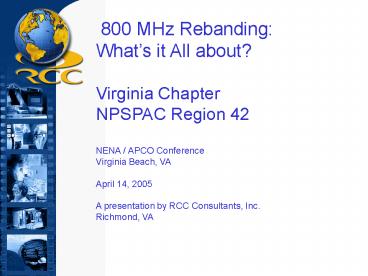800 MHz Rebanding: PowerPoint PPT Presentation
1 / 20
Title: 800 MHz Rebanding:
1
800 MHz Rebanding Whats it All
about? Virginia Chapter NPSPAC Region 42 NENA /
APCO Conference Virginia Beach, VA April 14,
2005A presentation by RCC Consultants,
Inc. Richmond, VA
2
800 MHz Rebanding The Reconfiguration
- The 800 MHz rebanding process involves
- A Physical Rebanding Process
- Mandatory shifting of licensees from the first
120 800 MHz channels to higher frequencies, - Mandatory shifting to lower frequencies of all
NPSPAC 800 MHz channels used today, - Retuning or replacing all radio systems and
subscriber units in order that they utilize the
new channel allocations and - A Commercial/Legal Process to determine the costs
of rebanding to be borne by Nextel.
3
(No Transcript)
4
800 MHz Rebanding The Deal in Theory
- The Transition Administrator (TA) allocates new
channels. - The licensees reconfigure their radio systems.
- Nextel pays the costs of reconfiguration.
- Nextel gives up some 800 MHz spectrum.
- The federal government receives money from Nextel
if rebanding costs are not too high. - Physical rebanding proceeds without a hitch.
- All concerned live happily ever after.
5
800 MHz Rebanding The Deal in Reality
- The allocation of new channels nationwide will
likely create new problems of a temporary or
permanent nature (new interference issues, loss
of interoperability, effect on VRS). - Complex radio systems (particularly simulcast
systems) cannot easily be rebanded without
unacceptable risks of interrupted operations and
system performance (availability, capacity, and
functionality). - Certain Public Safety licensees are significantly
more sensitive than other rebanding participants
to the dangers of reconfiguring mission-critical
radio systems while they are in-use supporting
emergency services. - The WAVE concept will cause concerns along wave
boundaries. - Incompatible frequency use
- Loss of interoperability
- Interference issues due to non-coordinated
operations
6
Transition Administrator Proposed Waves
7
Intricacies of Rebanding Some Concerns
851-854 NPSPAC 866-869 SMR
851-854 SMR/BLT/PS 866-869 NPSPAC
8
(No Transcript)
9
(No Transcript)
10
(No Transcript)
11
(No Transcript)
12
800 MHz Rebanding The Bottom Line
- The 800 MHz rebanding process
- is complex and involuntary
- involves an administrative process to allocate
new channels to replace old ones, although no
allocation scheme can be free of problems - involves a challenging engineering process to
address the physical dimension of rebanding and
to manage the risks to system operations of
rebanding and - involves a seriously contentious
commercial/legal proceeding between licensees and
Nextel to determine how the costs of the
rebanding process are borne.
13
800 MHz Rebanding The Engineering Challenges
- The 800 MHz rebanding process
- involves changing the channels on which
mission-critical radio systems operate while they
are operating - involves maintaining critical interoperability
with neighboring systems - requires creating a retreat path or safety net
to enable return to the existing system if the
rebanding process goes awry and - requires making sure that the rebanded system is
comparable to the unrebanded system.
14
800 MHz Rebanding The Commercial/Legal Challenges
- The 800 MHz rebanding process established by the
FCC - Is governed by rules that are general in nature,
not yet developed by application in particular
cases, and sometimes in conflict with one another - does not appoint any party to protect the
interests of the licensees (other than the
licensees themselves) - is fraught with conflicts among the interests of
participants and - requires licensees to fight for their rights
at all stages of the process.
15
800 MHz RebandingMotherhood, Apple Pie, Public
Safety
- Public Safety agencies traditionally view their
mission as being cooperative with the Federal
Government(FCC) and regulatory processes - It is not unpatriotic to ask
- How will rebanding affect my daily operation?
- Will I be fully reimbursed for the expense of
rebanding? - How is my agency protected from liability?
16
800 MHz Rebanding It is not unpatriotic to ask
- How will rebanding affect my daily operation?
- Will there be system degradation during
rebanding? - Will there be reduced system capacity during
rebanding? - How will the logistics of mobile and portable
reconfiguration be processed?
17
800 MHz Rebanding It is not unpatriotic to ask
- Will I be fully reimbursed for the expense of
rebanding? - Is additional staffing required to manage
rebanding? - Will time spent by all staff on the rebanding
issues be compensated? - Will legal and technical consultation be covered
under reimbursement? - Will overtime expenses be covered?
- How does this affect pension plans?
18
800 MHz Rebanding It is not unpatriotic to ask
- How is my agency protected from liability?
- What if rebanding goes awry Is there a fallback
system? - What if rebanding coincides with a major event?
- What if rebanding causes a communications failure
- Injury or death attributable to loss of
communication - Who is legally responsible?
19
Rebanding Strategy The Rights of Licensees
- The right to comparable facilities (the
Comparability Protection), - The right to avoid more than minimal disruption
of operations (the Disruption Protection), - The right to continuity of service (the
Continuity Protection), - The right to a redundant system, if necessary to
avoid serious disruption of system operations
(the Redundancy Protection), - The right to freedom from interference (the
Interference Protection), and - The right to have the reasonable costs of
rebanding borne by Nextel (the Cost
Protection).
20
800 MHz Rebanding Conclusion
- The Rebanding Process seems to be overly
simplified by the FCC, Transition Administrator,
and Nextel - This is the most significant event ever in the
history of land mobile radio - Public safety systems will be modified on-the-fly
while still expected to provide mission critical
services. - WAVE 1 tackles the largest concentration of 800
MHz licensees in the country - Problems should be expected.
- Estimated 70 of public safety mobiles are
operating in wave 1 - Questions?

